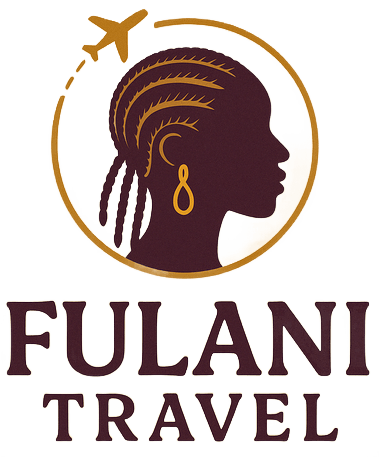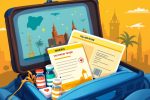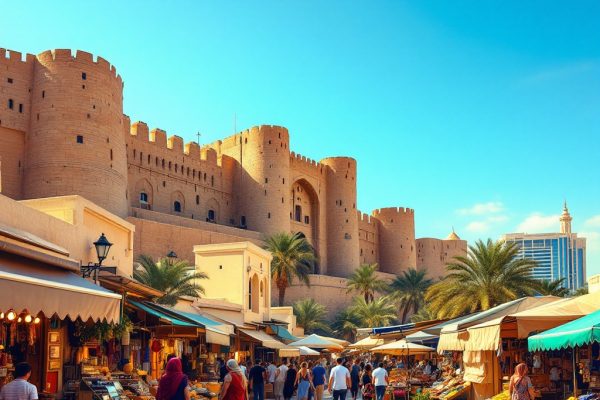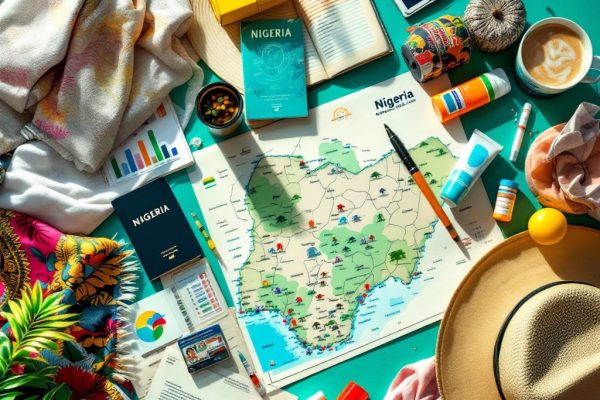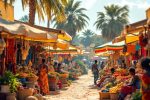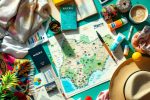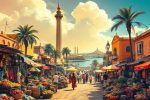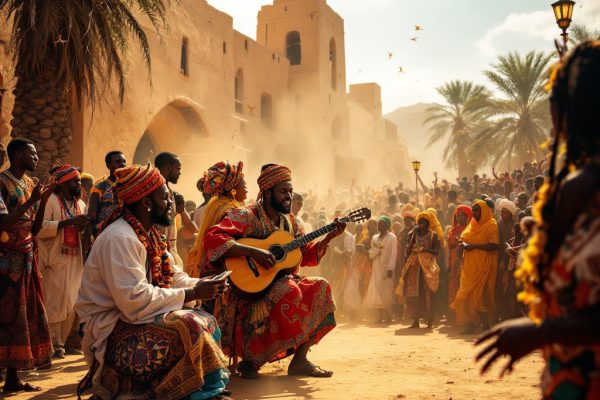How to Travel to Nigeria on a Budget: Flights, Hotels, and Transportation
Dreaming of exploring Nigeria without breaking the bank? Discover how to experience the vibrant culture and stunning landscapes on a budget! Learn how to secure affordable flights and accommodation, navigate local transportation, savor delicious cuisine for as little as $1, and engage in free or low-cost activities. From bustling markets to tranquil beaches, unlock the secrets to an unforgettable Nigerian adventure. Start planning your dream trip today!
Important information

- A yellow fever vaccination certificate is required for entry to Nigeria. Consult your doctor about other recommended vaccinations and malaria prevention.
- Book flights approximately 20 weeks in advance and aim for travel during the off-season (January or October) or mid-week for the best prices. Round-trip flights typically cost between $500 and $1,500.
- Accommodation ranges from budget-friendly hostels (around $10/night) to luxury hotels (up to $300/night). Ibis Lagos Airport and GTA Hotel Ikeja are recommended budget options.
- Utilize public transport like the BRT system in Lagos for affordable travel within cities. One-way fares typically cost between $0.50 and $2.
- Budget around $30-$50 per day for basic expenses. Enjoy affordable local cuisine at “bukas” and street food stalls, and explore free attractions like markets, beaches, and parks.
Travel Planning: Essential Tips for Visiting Nigeria on a Budget
Planning a budget-friendly trip to Nigeria? Start early and research visa requirements and recommended vaccinations, such as polio and yellow fever. Understanding local customs is crucial for both budgeting and ensuring a smoother, more enjoyable trip. Respecting local traditions will also deepen your cultural immersion. Plan ahead and get ready to experience Nigeria!
Visa Requirements and Vaccination Advice for Travelers
American citizens can visit Nigeria visa-free for up to 90 days. However, for longer stays, a visa is required.
Ensure your passport’s validity extends six months beyond your intended departure date.
A yellow fever vaccination certificate is mandatory for entry.
Vaccinations for Hepatitis A and B are recommended.
Consult your doctor about malaria prevention and other necessary medications.
How to Plan Your Trip During Off-Peak Seasons
Escape the crowds and enjoy pleasant weather by traveling during the shoulder seasons—April to May or September to October.
Booking flights and accommodations well in advance is essential, particularly for holidays like Christmas and Easter.
To snag the best deals, compare prices across various airlines and travel websites.
Flexibility with your travel dates, such as flying mid-week, can also lead to significant savings.
Consider flying into smaller, less popular airports near your destination for potentially lower fares.
Finding Cost-Effective Flights to Nigeria
Planning a Nigerian adventure? Secure the best flight deals by booking approximately 20 weeks in advance. Round-trip fares typically range between $500 and $1,500, although prices vary based on your departure city and travel dates. Utilize flight comparison websites to find the best deals across various airlines. Flexibility with your travel dates can also lead to savings. For example, consider flying mid-week or during the off-season (January or October) for potentially lower fares. Setting up fare alerts can help you track price drops and seize savings opportunities. Don’t overlook connecting flights, as these can sometimes be more economical than direct routes. Also, look out for seasonal airline promotions for additional ways to reduce travel costs.
Tips for Booking Cheap Flights
Plan ahead and book your flights about 20 weeks in advance to secure the best deals, as prices typically increase closer to the departure date.
Consider flying during off-peak seasons, such as early October or January, for even lower fares.
If your schedule is flexible, flying on a Tuesday is often cheaper than flying on a Sunday.
Utilize comparison websites to explore deals from various airlines and find the most cost-effective option.
Being flexible with your travel dates can also lead to significant savings.
Sign up for fare alerts to receive notifications of price drops and ensure you don’t miss a bargain.
Don’t rule out connecting flights, as they can sometimes be more economical than direct routes.
The Importance of Booking Flights in Advance
Planning your trip to Nigeria approximately 20 weeks in advance can help you secure the most affordable flight prices. Flexibility with your travel dates can also contribute to savings; mid-week flights, such as on Tuesdays, are often cheaper. Traveling during the low season, particularly in January or October, can also result in significant discounts. Finally, using fare comparison websites allows you to easily compare prices and find the ideal flight for your budget.
Accommodation Options: Affordable Hotels in Nigeria
Nigeria offers a range of accommodations to suit every budget and travel style. From budget-friendly hostels to luxurious hotels, finding the perfect place to stay is easy. For budget travelers, hostels offer basic amenities for around $10 per night. Mid-range hotels provide a balance of comfort and affordability, typically costing between $20 and $25. For a luxurious experience, high-end hotels offer premium services, with prices reaching up to $300 per night. Hotels generally offer better value than vacation rentals.
Budget-Friendly Options
Ibis Lagos Airport and GTA Hotel Ikeja are excellent choices for budget-conscious travelers. Venturing outside major tourist hubs may also yield even lower prices.
Unique Experiences
If cultural immersion is a priority, couchsurfing offers a unique opportunity to connect with locals and experience Nigerian culture firsthand.
When deciding where to stay, consider your budget and travel style to find the perfect accommodation for your Nigerian adventure.
Exploring the Range of Accommodation Costs
Nigeria offers a variety of accommodations, with prices generally ranging from $20 to $300 nightly. Budget-friendly hotels provide basic amenities for travelers seeking affordable options. For a more luxurious stay, premium services and top-notch facilities are available at a higher price point.
Budget-friendly hotels
these hotels offer basic amenities at affordable prices, suitable for travelers on a budget.
Luxury hotels
Luxury hotels provide premium services and top-notch facilities for a more luxurious experience, although at a higher cost.
Choosing Between Budget and Luxury Hotels
Budget hotels focus on affordability, providing essential amenities at a lower cost. These hotels are a practical choice for travelers prioritizing value and basic comforts.
Luxury hotels deliver premium services, upscale facilities, and personalized experiences. While priced higher, they offer a luxurious and indulgent stay with enhanced amenities and attentive service.
When choosing a hotel, consider your individual needs and budget. Nigerian hotels offer diverse options catering to various budgets and preferences.
Transportation: Navigating Nigeria on a Budget
Traveling in Nigeria doesn’t have to be expensive. Public transport, such as buses and the metro system, offers a cost-effective alternative to taxis or car rentals. In Lagos, for example, the Bus Rapid Transit (BRT) system provides affordable access across the city.
Tips for Budget-Friendly Travel in Nigeria
To maximize your savings, plan your journeys in advance. Research routes and timetables.
- Consider purchasing a travel pass if available, as this is typically more economical than individual tickets.
Example
In Lagos, the Bus Rapid Transit (BRT) system offers an affordable way to travel throughout the city.
Public Transportation vs. Car Rentals
Traveling by bus or metro in Nigeria offers a cost-effective and comfortable way to explore the city. Public transport is often more affordable than car rentals and taxis. These readily available options provide a convenient and immersive urban experience.
Saving Money with Buses and Metro Systems
Traveling by bus or metro in Nigerian cities is an economical choice. One-way fares typically cost between 50 cents and two dollars. This significantly reduces travel expenses compared to taxis or rental cars. Pre-planning your routes with local transport apps will further enhance efficiency and affordability.
Money Management: Currency and Living Expenses
Money Exchange and Costs in Nigeria
To secure the best exchange rates, use official bureaus or banks. Avoid airport kiosks and hotels, as they often have higher rates. Paying in Nigerian Naira generally offers better prices. ATMs are another option with competitive rates, but watch out for potential fees.
Budgeting for Your Trip
Budget travelers can expect to spend around $30 to $50 per day for basic accommodation, food, and local transportation. Budget-friendly rooms are available from $10, while mid-range hotels begin at $50. Meals at local restaurants typically cost between $5 and $10, with street food being even cheaper. Public transport is a cost-effective way to travel.
Currency Exchange Tips for Travelers
Get the best exchange rate by using Nigerian Naira. Skip the pre-trip currency exchange and withdraw cash from Nigerian ATMs when you arrive. This helps you avoid high fees from airport kiosks and exchange bureaus. Remember to inform your bank of your travel dates to prevent card blocks. Also, check with your bank or credit card company regarding potential foreign transaction fees.
Typical Living Expenses for Budget Travelers
Planning a budget-friendly trip to Nigeria? A daily budget of $30 to $50 should comfortably cover your basic needs, including accommodation, food, and transportation.
Dining and Activities: Enjoying Nigeria Without Overspending
Experience Nigeria’s vibrant culture and stunning landscapes without breaking the bank. Indulge in delicious local cuisine, with meals ranging from $2 to $20. Savor street food delicacies like Suya and Akara for around $1. Local “Bukas” (restaurants) offer another budget-friendly dining experience. Explore bustling markets, relax on pristine beaches, or find tranquility in peaceful parks, all for free.
Embrace the Culinary Delights
Nigeria’s culinary scene offers incredible value. Street food is a must-try, with favorites like Suya and Akara at approximately $1. “Buka” restaurants provide an authentic local experience with budget-friendly meals, including the iconic jollof rice.
Explore Affordable Activities
Discover a wealth of free experiences. Immerse yourself in the vibrant atmosphere of local markets, unwind on beautiful beaches, or find serenity in peaceful parks. For structured activities, consider options like the National Museum and Lekki Conservation Centre in Lagos, or Yankari National Park, all at reasonable prices.
Maximize Your Budget
Traveling with a group can significantly reduce costs by sharing accommodation and transportation. Look for deals and discounts to make the most of your budget. Consider self-catering if you have access to a kitchen for even greater savings.
Experience Local Cuisine
Explore local “Bukas” (restaurants) for authentic and affordable meals. Sample street food delicacies like Suya and Akara for around $1.
Free Activities
Enjoy free activities like exploring bustling local markets, relaxing on pristine beaches, and finding tranquility in peaceful parks.
Enjoy Local Cuisine on a Budget
Nigerian cuisine is budget-friendly, especially if you explore the vibrant street food scene. Delicious treats like suya and akara are available for around a dollar. Local eateries, known as “bukas,” offer a wide range of meals, with prices typically between $2 and $20. Authentic Nigerian dishes are also readily available at local markets and food stalls, often at even lower prices. For the ultimate savings, preparing some meals at home, if you have access to a kitchen, is the most economical option.
Engage in Free or Low-Cost Activities
Explore Nigeria on a budget! Discover free attractions such as the National Museum in Lagos or the Lekki Conservation Centre. Immerse yourself in the bustling atmosphere of local markets and relax on Nigeria’s stunning beaches. For an affordable nature escape, consider Yankari National Park. Traveling in a group can also lower costs, by sharing accommodation and splitting transportation expenses. Find deals and discounts on activities to make your trip even more budget-friendly.
Free Attractions
- National Museum, lagos.
- Lekki Conservation Centre.
- Local markets.
- Beaches.
Budget-Friendly Options
- Yankari National Park.
- Group travel.
- Deals and discounts on activities.
